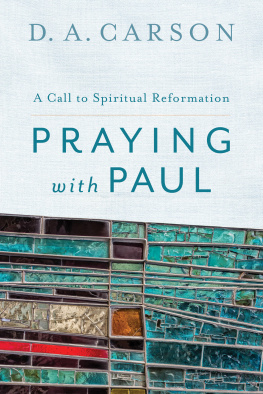
Foreword
Father Peter John Cameron, O.P.
I began to develop a special love for Saint Paul in the years when I was studying for the priesthood. Saint Paul had helped me get through college. Very often I would begin my day by praying a passage from the Letter to the Romans where the counsel of the Apostle was a constant source of solace: offer your body as a living sacrifice holy and acceptable to God; do not conform yourself to this age but be transformed by the renewal of your mind; then you will be able to judge what is Gods will, what is good, pleasing, and perfect (see Rom 12: 1-2). For me, college was a real struggle, challenging and difficult. Making these words of Saint Paul the heart of my morning prayer gave me a new heart to meet each day with hope.
But it was in a Scripture class on the Acts of the Apostles taught by a saintly Franciscan friar that my appreciation for Saint Paul really blossomed. I was assigned to give a class presentation on Saint Pauls speech to the elders at Miletus. In the course of my research, I discovered the fact that several biblical scholars hold the opinion that there is a definite parallel between this farewell address of Paul and the Last Supper discourse of Jesus. The comparisons are amazing.
Paul as Jesus
Try looking at Saint Pauls speech (Acts 20: 17-38), and then compare it to, for example, the Last Supper discourse of the Gospel of John (chapters 14-17). Among the many parallels, Saint Paul attests to how he served the Lord in humility, despite the sorrows and trials that came his way from enemies. And Jesus says in all humility: The words that I speak to you I do not speak on my own The Father is greater than I The world [has] hated me (Jn 14: 10, 28; 15: 18). Paul testifies that he never shrank from telling the people what was for their good he taught them constantly in public and in private. Jesus declares, Father, I revealed your name The words you gave to me I have given to them (Jn 17: 6, 8). Saint Paul states that he insisted solemnly on faith in our Lord Jesus Christ. Likewise, Jesus says to his disciples, You have faith in God; have faith also in me (Jn 14: 1). Paul claims that he will put value on his own life only if he can finish his race and complete his service of witnessing to the Gospel. In the same spirit, Jesus prays, Father, [] I glorified you on earth by accomplishing the work you gave me to do (Jn 17: 4). Then Saint Paul says that none of those listening to him will ever see his face again. And Jesus says, In a little while the world will no longer see me (Jn 14: 19). Paul warns that when he is gone, savage wolves will come to ravage the flock. Jesus warns that his disciples will be persecuted: not only will they be expelled from the synagogue they will be put to death by people who claim to be serving God (see Jn 16: 2). Paul then commends his people to the Lord and to Gods gracious Word which can enlarge them. And Jesus prays to his Father for his followers: Consecrate them in the truth. Your word is truth (Jn 17: 17).
After this speech, the Bible says that Paul knelt down and prayed with the people. They all began to weep without restraint, throwing their arms around him and kissing him, so upset were they to hear that they would never see his face again. And Jesus told his disciples: You will weep and mourn; you will grieve, but your grief will become joy (Jn 16: 20).
I was struck at the deliberate manner in which the portrait of Saint Paul on the way to his martyrdom is modeled on Jesus as he approaches his passion. And when I saw how moved the people were at Pauls farewell, I realized that this was a man I needed to get to know better. I wanted to be like him who was so much like Christ.
Ourselves as Paul
When it comes to the spiritual life, we so easily come up with pretexts for discounting the possibility of ever becoming holy. But the great genius of Saint Paul is the way he strips us of every alibi there is no excuse for not pursuing sanctity. With an authority like no other, Saint Paul attests that God chose the lowly and despised of the world, those who count for nothing, to reduce to nothing those who are something (1 Cor 1: 28). This means that no matter how inadequate, deficient, or unworthy I may think I am, the fact is that God has chosen precisely people like me. The Fathers consummate mercy is expressed in the fact that God calls into being what does not exist (Rom 4: 17) especially what does not yet exist in my person that God purposefully calls into being so that I will become fulfilled and happy. When I verify the fact that God acts this way in the world, I get filled with an irrepressible hope, and hope does not disappoint, because the love of God has been poured out into our hearts (Rom 5: 5). What is more, my experience of personal inability and anguish becomes a tool for sanctifying others, for God encourages us in our every affliction, so that we may be able to encourage those who are in any affliction with the encouragement with which we ourselves are encouraged by God (2 Cor 1: 4).
In order to bless us with unfailing certainty and to protect us from the presumption that would tempt us to take all this for granted, God does something that, on the surface, may seem strangely contradictory. Saint Paul explains how, at a certain point in his life, he and his companions were left to feel like men condemned to death so that we might trust not in ourselves but in God who raises the dead (2 Cor 1: 9). Gods extreme tenderness extends to providing safeguards that prevent us from falling into self-destructive self-reliance. In this blessed relationship of holy dependence, our freedom is set free (see Gal 5: 1). And even though it may look to the world as if we have nothing, as followers of Jesus Christ we in fact possess everything (see 2 Cor 6: 10). To insure our fidelity and growth in this priceless way of living, God has given us an infallible method: we are always carrying about in the body the dying of Jesus, so that the life of Jesus may also be manifested in our body (2 Cor 4: 10). In another place, Saint Paul says it even more emphatically: I have been crucified with Christ; yet I live, no longer I, but Christ lives in me For to me life is Christ (Gal 2: 19-20; Phil 1: 21). This is what prompts Paul to declare: I even consider everything as a loss because of the supreme good of knowing Christ Jesus my Lord. For his sake I have accepted the loss of all things and I consider them so much rubbish, that I may gain Christ (Phil 3: 8).
All because of Gods goodness and not because of our own Jesus Christ has loved us, and that undeserved, indescribable love has utterly transformed us. It has become who we are. For what will separate us from the love of Christ? Will anguish, or distress, or persecution, or famine, or nakedness, or peril, or the sword? (Rom 8: 35). Paul knows from personal experience that none of these sufferings can ever sever us from the love of Christ because Paul himself personally went through every one of them in the course of his life. Christs love consistently conquered! Which leads Saint Paul to proclaim that in all these things we conquer overwhelmingly through him who loved us (Rom 8: 37).
Saint Paul concludes that all that really matters is that one become a new creation (see Gal 6: 15 and 2 Cor 5: 17). And how does this come about? All depends on faith (Rom 4: 16). You have had yourselves washed, you were sanctified, you were justified in the name of the Lord Jesus Christ (1 Cor 6: 11). In the light of all this, Pauls claim that, as Christians, we even boast of our afflictions (see Rom 5: 3) no longer seems strange but rather perfectly reasonable. As Saint Paul explains, I will rather boast most gladly of my weaknesses, in order that the power of Christ may dwell with me. Therefore, I am content with weaknesses, insults, hardships, persecutions, and constraints, for the sake of Christ; for when I am weak, then I am strong (2 Cor 12: 9-10). Even Pauls command, that otherwise would strike us as arrogantly egoistic, comes across in crystal clarity: Be imitators of me, as I am of Christ (1 Cor 11: 1). We imitate Paul in the way that he abandons himself totally to the mercy of Jesus Christ. It is the historical fact of his example that dares us to do the same with our life.
Next page














